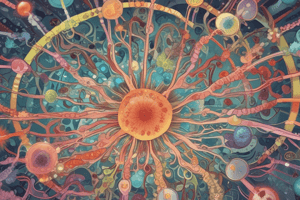Podcast
Questions and Answers
Where do B cells develop before maturing?
Where do B cells develop before maturing?
- Spleen
- Bone marrow (correct)
- Lymph nodes
- Thymus
What do B cells recognize directly without the need for Antigen Presenting Cells?
What do B cells recognize directly without the need for Antigen Presenting Cells?
- Peptides
- Membrane proteins
- Free antigens (correct)
- Intracellular pathogens
What is the primary function of B cells?
What is the primary function of B cells?
- Phagocytize foreign particles
- Activate T cells
- Produce antibodies (correct)
- Secrete cytokines
Which immune response do B cells primarily contribute to?
Which immune response do B cells primarily contribute to?
What happens to B cells after activation by foreign antigens?
What happens to B cells after activation by foreign antigens?
What are the long-lived survivors of previous infections called?
What are the long-lived survivors of previous infections called?
What is secreted by effector B cells in response to antigens?
What is secreted by effector B cells in response to antigens?
What is the process called when plasma B cells die after their function is completed?
What is the process called when plasma B cells die after their function is completed?
Flashcards
Where do B cells develop?
Where do B cells develop?
B cells, a type of white blood cell, develop in the bone marrow.
What do B cells recognize directly?
What do B cells recognize directly?
Free antigens are substances that can trigger an immune response. B cells recognize these antigens directly, unlike T cells that require antigen-presenting cells.
What do B cells produce?
What do B cells produce?
B cells produce antibodies, proteins that bind to specific antigens and neutralize them.
What immune response are B cells a major part of?
What immune response are B cells a major part of?
Signup and view all the flashcards
What does antibody production depend on?
What does antibody production depend on?
Signup and view all the flashcards
What happens when B cells activate?
What happens when B cells activate?
Signup and view all the flashcards
What are memory B cells?
What are memory B cells?
Signup and view all the flashcards
What do plasma cells secrete?
What do plasma cells secrete?
Signup and view all the flashcards
Study Notes
B Cells
- Develop in lymph nodes and spleen
- Recognize free antigens
- Rely on Antigen Presenting Cells (unlike T cells)
- Primary function: produce antibodies
- Crucial role in the immune response, targeting foreign antigens
Antibody Response
- Primarily dependent on helper T cell involvement
- Activation by foreign antigens leads to:
- Plasma cells releasing antibodies
- Memory B cells formation
- Plasma cells are long-lived and maintain antibody production; these cells remember previous infections
- Memory B cells respond to re-exposure of particular antigens
- Antibodies: specialized proteins with unique antigen-binding properties, found on the surface of the original B cell
- Antibodies circulate in bodily fluids (blood, bile, etc.)
- Antigen binding leads to various actions:
- Agglutination
- Neutralization
- Immobilization
- Complement system activation
Plasma Cells
- Short-lived effector cells
- Do not exhibit antigen-binding receptors
Cell Death
- Plasma cells undergo apoptosis after a foreign agent is destroyed
Studying That Suits You
Use AI to generate personalized quizzes and flashcards to suit your learning preferences.




